Shark sightings in the Mediterranean: Swim with caution!
Discover the latest shark sightings in the Mediterranean: causes, risks and how to stay safe.

Shark sightings in the Mediterranean: Swim with caution!
The Mediterranean continues to be popular with holidaymakers, but reports of shark sightings are causing excitement. These sightings extend from Spain to Croatia, with the risk to bathers considered low despite media attention. Particularly striking are the sightings of blue sharks, which have repeatedly made headlines in recent months.
In Spain, a central point for shark sightings, several encounters have been documented in the coastal regions of the Balearic Islands, Valencia and Alicante. An incident in May 2024, when a blue shark was spotted on the beach at Arenal d'en Castell, even led to a short-term beach closure. There was also an incident in August 2023 in which a man was slightly injured by a blue shark on Rabdells beach in Valencia. However, such incidents are extremely rare.
Current shark sightings in the Mediterranean
A young great white shark was caught in Montenegro in June 2025 and then released. Historically, the Adriatic Sea was a hotspot for great white sharks, but their population has declined sharply. Shark sightings are rarer in Croatia and Montenegro, but the Greek Shark Logbook documents sightings in Greece, mostly reported by fishermen. Another example is the sighting of a great white shark off Livorno in June 2023.
Statistics also show that Italy and Greece have historically recorded the most shark attacks in the Mediterranean. Nevertheless, sightings have decreased significantly in recent decades. The current chance of being attacked by a shark is about 1 in 4 million, and most shark species, such as the blue shark, avoid humans.
The importance of sharks and safety measures
Sharks play a crucial role in the maritime ecosystem by regulating populations of marine life. With rising sea temperatures and overfishing, sharks are moving closer to shores, increasing the likelihood of sightings. Experts recommend the following to swimming bathers: Remain calm and withdraw slowly from the water so as not to further aggravate the situation. In the event of shark sightings, local authorities should be informed to make an appropriate assessment of the situation.
The media also reports on innovative protective measures. Smart buoys and apps like Sharktivity are used to alert swimmers of possible shark sightings. At the same time, a newly developed high-tech electric fence could help deter sharks without endangering other sea creatures.
Vacationers should be aware of their surroundings, especially at dusk or near fishing areas, and always approach the risks with caution, even if the likelihood of an attack is extremely low. Despite the fascination and fear that sharks evoke, a rational assessment of the situation remains crucial.
For more information on shark sightings in the Mediterranean, see reports from Mercury and Watson be consulted.

 Suche
Suche
 Mein Konto
Mein Konto